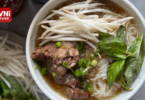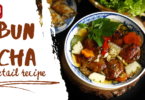The Tale of Banh Canh Cua
Originating from Vietnam, Banh Canh Cua stands as one of the most beloved variations of the renowned Banh Canh, a quintessential dish in Vietnamese cuisine. Its popularity spans not only among locals but also among travelers eager to explore the rich tapestry of Vietnamese flavors.
Banh Canh Cua derives its name from its key ingredients: “Banh Canh” refers to the thick, chewy noodles made from rice or tapioca flour, while “Cua” denotes the succulent crab meat that graces this dish. The broth, infused with the sweet essence of crab, forms the soul of Banh Canh Cua, evoking a sense of comfort and nostalgia.
What sets Banh Canh Cua apart is not just its delectable taste, but also its cultural significance. It is a dish deeply rooted in Vietnamese culinary traditions, often enjoyed during family gatherings, festive occasions, and casual meals alike. Its widespread popularity is a testament to its ability to delight palates across generations and regions.
In Vietnam, street vendors and family-owned eateries often specialize in serving this beloved dish, each adding their unique twist to the recipe. Whether enjoyed in the bustling streets of Ho Chi Minh City or the serene countryside of Hue, Banh Canh Cua offers a culinary journey like no other, captivating diners with its rich flavors and heartwarming aromas.
Banh Canh Cua Recipe
Ingredients:
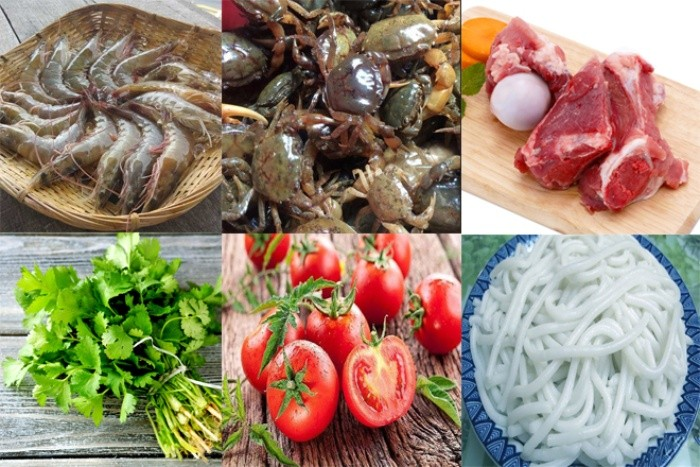
- 500g fresh crab (cleaned and chopped into pieces)
- 300g rice flour or tapioca flour
- 1 liter water
- 1 liter chicken or pork broth
- 2-3 cloves garlic (minced)
- 1 shallot (minced)
- 1 tablespoon fish sauce
- 1 teaspoon sugar
- Salt and pepper to taste
- Chopped green onions and cilantro for garnish
- Optional: shrimp, pork, quail eggs
Instructions:
Step 1. Prepare the Broth
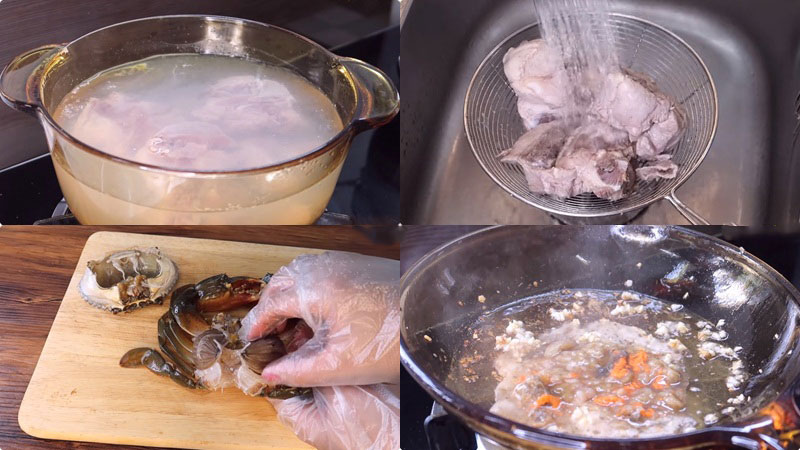
- In a large pot, bring the chicken or pork broth to a boil over medium heat.
- Add the chopped crab pieces to the broth and simmer for about 10-15 minutes until the crab meat is cooked through and flavorful.
- Remove the crab pieces from the broth and set aside. Strain the broth to remove any impurities and return it to the pot.
Step 2. Make the Noodles
Choosing between tapioca or rice noodles for Banh Canh Cua depends on personal preference and dietary restrictions.
- Tapioca Noodles: Tapioca noodles tend to be thicker and chewier, providing a heartier texture to the dish. They are gluten-free, making them suitable for those with gluten intolerances or allergies.
- Rice Noodles: Rice noodles are thinner and lighter in texture, offering a delicate mouthfeel. They are a traditional choice for Banh Canh Cua and are well-loved for their ability to absorb the flavors of the broth.
Here we’re introducing you to how to make homemade noodles for Banh Canh Cua:
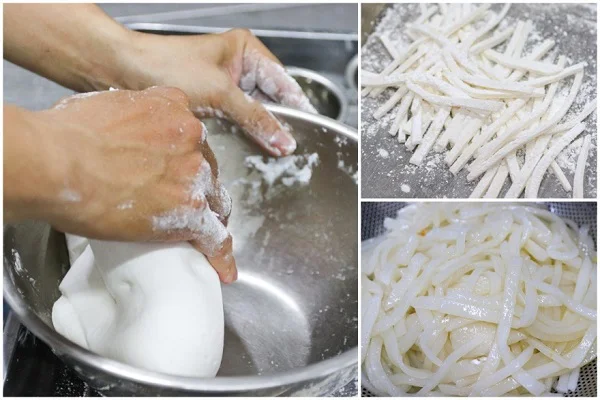
- In a mixing bowl, combine the rice flour or tapioca flour with water to form a smooth, thick batter.
- Bring a separate pot of water to a boil and add the batter to the pot in small portions, stirring continuously to prevent clumping.
- Cook the noodles for about 5-7 minutes until they float to the surface and are cooked through. Remove from heat and rinse with cold water to prevent sticking.
Step 3. Prepare the Seasonings
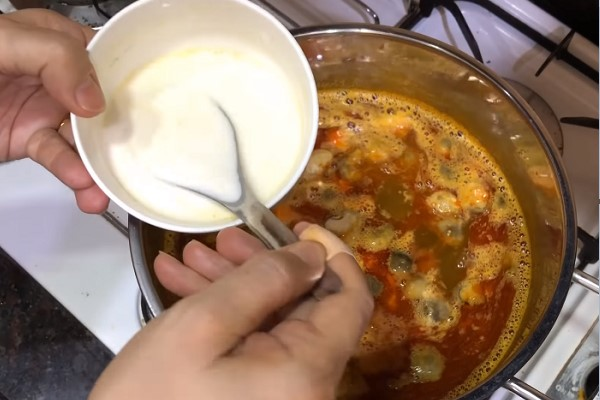
- In a skillet, heat a tablespoon of oil over medium heat and sauté the minced garlic and shallot until fragrant.
- Add the cooked crab pieces back to the skillet and stir-fry for a few minutes until lightly browned.
- Season with fish sauce, sugar, salt, and pepper to taste. Adjust the seasoning according to your preference.
Step 4. Assemble the Dish
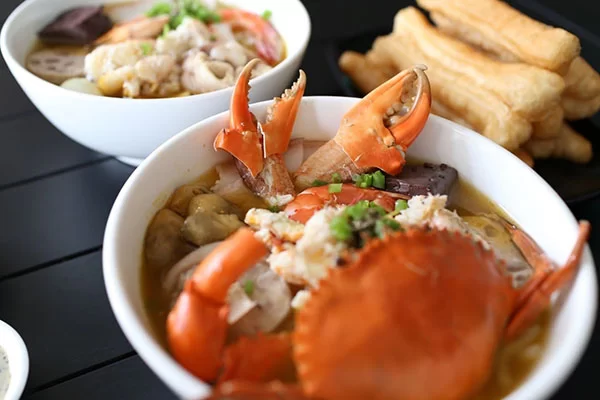
- Divide the cooked noodles into individual serving bowls.
- Ladle the hot broth over the noodles, making sure to include pieces of crab meat in each bowl.
- Top with the stir-fried crab and seasonings.
- Garnish with chopped green onions and cilantro for added freshness and flavor.
Step 5. Serve and Enjoy
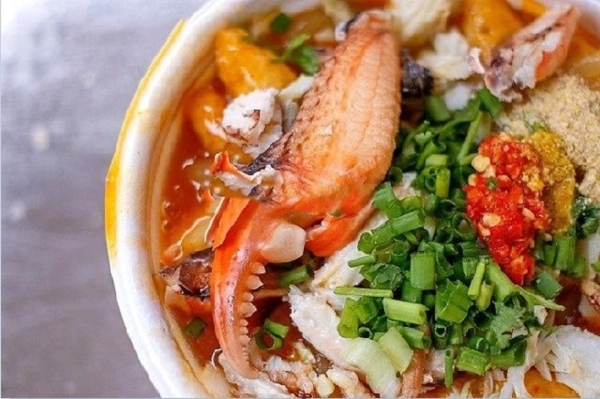
- Serve the Banh Canh Cua hot, accompanied by fresh herbs, lime wedges, and chili slices on the side.
- Enjoy the delightful combination of savory broth, tender crab meat, and chewy noodles with your family and friends!
Key Notes When Making Banh Canh Cua At Home
- Ingredients: Ensure you have all the necessary ingredients on hand, including rice or tapioca flour for making the noodles, fresh crab meat (or alternatively, you can use crab claws or legs), aromatics such as shallots, garlic, and green onions, and essential seasonings like fish sauce, salt, and sugar.
- Broth Preparation: The key to a flavorful Banh Canh Cua lies in the broth. Simmer crab shells or crab stock with aromatics like shallots, garlic, and ginger to extract maximum flavor. Season the broth with fish sauce, salt, and sugar to taste, and allow it to simmer gently for at least an hour to develop rich flavors.
- Cooking the Crab Meat: If using fresh crab meat, lightly season it with salt and pepper and quickly sauté it in a pan until cooked through. Be careful not to overcook the crab meat, as it can become tough and rubbery.
- Assembly: Once the broth is ready and the noodles are cooked, assemble the dish by placing a generous portion of noodles in a bowl. Ladle the hot broth over the noodles, ensuring each serving has a good amount of crab meat. Garnish with chopped green onions and cilantro for freshness.
- Serve Hot: Banh Canh Cua is best enjoyed piping hot, so serve it immediately after assembling. Provide additional condiments like chili sauce, lime wedges, and fish sauce on the side for diners to adjust the flavor according to their preference.
- Customization: Feel free to customize your Banh Canh Cua by adding other ingredients such as shrimp, pork, or quail eggs. You can also incorporate vegetables like choy sum or bok choy for added texture and nutrition.
- Storage: If you have leftovers, store the broth, noodles, and crab meat separately in airtight containers in the refrigerator. Reheat the components individually and assemble just before serving to maintain the dish’s freshness and flavor.
Final Words
For those seeking an authentic taste of Vietnam, Banh Canh Cua is a must-try experience. Its combination of savory broth, tender crab meat, and chewy noodles creates a symphony of flavors that lingers long after the last spoonful. Whether you’re a seasoned traveler or a curious food enthusiast, Banh Canh Cua promises an unforgettable culinary adventure, inviting you to savor the essence of Vietnamese culture, one bowl at a time.
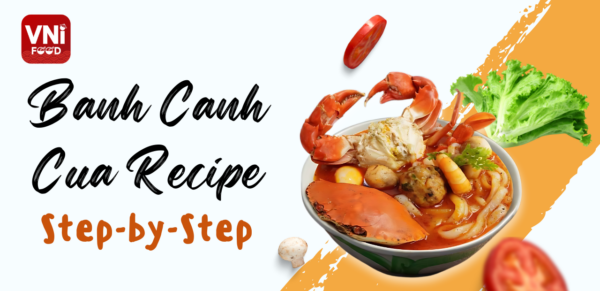
| Prep Time | 15 minutes |
| Cook Time | 50 minutes |
| Servings |
people
|
- 500 gram fresh crab (cleaned and chopped into pieces)
- 300 gram flour or tapioca flour
- 1 liter Water
- 1 liter chicken or pork broth
- 2-3 cloves garlic (minced)
- 1 shallot (minced)
- 1 tbsp Fish sauce
- 1 tsp Sugar
- Salt and pepper to taste
- Chopped green onions and cilantro for garnish
- Optional: shrimp, pork, quail eggs
Ingredients
|

|
- In a large pot, bring the chicken or pork broth to a boil over medium heat. Add the chopped crab pieces to the broth and simmer for about 10-15 minutes until the crab meat is cooked through and flavorful. Remove the crab pieces from the broth and set aside. Strain the broth to remove any impurities and return it to the pot.
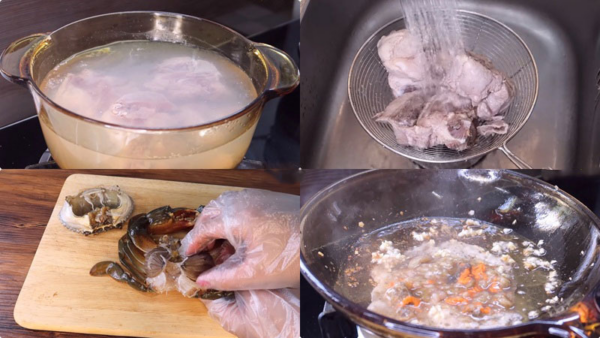
- Choosing between tapioca or rice noodles for Banh Canh Cua depends on personal preference and dietary restrictions. Tapioca Noodles: Tapioca noodles tend to be thicker and chewier, providing a heartier texture to the dish. They are gluten-free, making them suitable for those with gluten intolerances or allergies. Rice Noodles: Rice noodles are thinner and lighter in texture, offering a delicate mouthfeel. They are a traditional choice for Banh Canh Cua and are well-loved for their ability to absorb the flavors of the broth. In a mixing bowl, combine the rice flour or tapioca flour with water to form a smooth, thick batter. Bring a separate pot of water to a boil and add the batter to the pot in small portions, stirring continuously to prevent clumping. Cook the noodles for about 5-7 minutes until they float to the surface and are cooked through. Remove from heat and rinse with cold water to prevent sticking.

- In a skillet, heat a tablespoon of oil over medium heat and sauté the minced garlic and shallot until fragrant. Add the cooked crab pieces back to the skillet and stir-fry for a few minutes until lightly browned. Season with fish sauce, sugar, salt, and pepper to taste. Adjust the seasoning according to your preference.

- Divide the cooked noodles into individual serving bowls. Ladle the hot broth over the noodles, making sure to include pieces of crab meat in each bowl. Top with the stir-fried crab and seasonings. Garnish with chopped green onions and cilantro for added freshness and flavor.

- Serve the Banh Canh Cua hot, accompanied by fresh herbs, lime wedges, and chili slices on the side. Enjoy the delightful combination of savory broth, tender crab meat, and chewy noodles with your family and friends!



